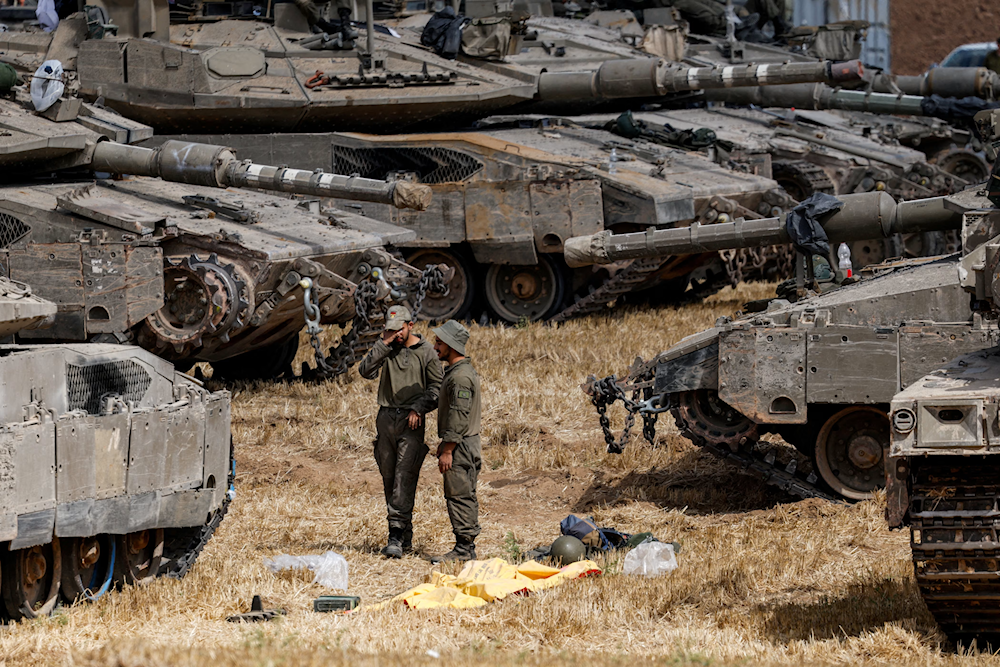WSJ: War fatigue grows in 'Israel' 19 months into war on Gaza
Roughly 70% of Israelis now back ending the Gaza war for the release of the captives, as reservist fatigue, protests, and political pressure mount on Netanyahu, according to the Wall Street Journal.
-

Israeli occupation forces near military vehicles at the Gaza border in this undated photo (AP)
More than 19 months into "Israel's" brutal assault on Gaza, public opinion in “Israel” has undergone a stark shift according to the Wall Street Journal.
Where there was once near-unanimous support for military action following Al-Aqsa Flood, a growing majority now favors ending the war in exchange for the release of remaining captives. Recent polling reported by the Wall Street Journal shows nearly 70% of Israelis support this trade-off, reflecting mounting frustration, war fatigue, and political disillusionment.
In the early months, many Israelis rallied behind the twin goals of defeating Palestinian Resistance group Hamas and bringing home the 251 captives taken during the flood.
But by January 2024, the public had already begun to fracture on priorities. Today, as battlefield goals appear elusive and the human and economic tolls rise, that division has deepened into a widespread call for a ceasefire.
Exhaustion among reservists drives dissent
Weekly protests across Yaffa, "Tel Aviv," once focused solely on the return of captives. Now, signs across the occupied city explicitly demand an end to the war. The repeated deployment of Israeli reservists, many for hundreds of days across Gaza, Syria, and the occupied West Bank, has left Israeli occupation soldiers and their settler families exhausted.
Commanders report difficulty recruiting fresh forces, while thousands of current and retired occupation troops have signed open letters urging the Israeli regime to stop the war.
Among those calling for restraint is Rotem Sivan-Hoffmann, an Israeli settler and founder of “Ima Era,” a movement of mothers of Israeli occupation soldiers.
As reported by the Wall Street Journal, she says, “They are sending my son [an IOF soldier] to die for Netanyahu’s political survival.” Her son is currently stationed near Gaza, awaiting orders.
Meanwhile in Gaza, the famine continues under "Israel's" March 2 blockade, which has left human rights organizations globally demanding that "Israel" stop using aid as a "weapon of war".
Dalit Kislev Spektor, another member of Ima Era, has her husband and two sons taking part in the military assault in the Gaza Strip. “The feeling that we lost our way grew stronger and stronger,” she told WSJ, describing the war as increasingly political and lacking clear objectives.
Political pressure builds against Netanyahu
The shift in public sentiment coincides with a wave of international pressure. The US, UK, France, and Canada have all warned “Israel” against expanding its military operations in Gaza. A White House spokesperson said US President Donald Trump wants an end to the fighting.
According to the Wall Street Journal, the backlash is also transforming “Israel’s” internal political map. Rising in the polls is Yair Golan, a former general now leading the Democrats Party. His open critique of the war, including statements such as, “A sane country doesn’t kill babies as a pastime”, would have been politically unthinkable just months ago. His party would now rank as the third or fourth largest if elections were held, recent polls suggest.
Supporters of the Gaza assault are also wavering. Hen Mazzig, a prominent pro-Israeli advocate with over 700,000 followers, recently wrote on X that the war had become indefensible. “In the first few months we understood the need,” he said. “But in the past year, it has just been very challenging to defend the actions of the government."
However, early reports from the assault on Gaza show that the dire humanitarian crisis and mass killings of Palestinians was evident from the first few weeks since the Al-Aqsa flood. On November 1, 2023, just one month after October 7, 2023, the director of the OHCHR resigned after his criticism of the long-standing Israeli aggression supported by Western governments and the dehumanization of Palestinians by Western media.
Humanitarian concerns shift mainstream perception
While the international outcry over “Israel’s” military campaign has centered on Palestinian civilian casualties, with over 53,000 Palestinians killed, according to Gaza’s Health Ministry, this hasn’t been the main force driving Israeli opposition.
Instead, domestic trauma, distrust in the Israeli occupation government, and social fatigue have shaped internal sentiment, according to WSJ.
Still, some Israelis on the center-left are beginning to oppose the war on humanitarian grounds. Pollster Tamar Hermann noted, “There is an awakening... it can be felt—for the war to stop for humanitarian reasons."

 4 Min Read
4 Min Read








